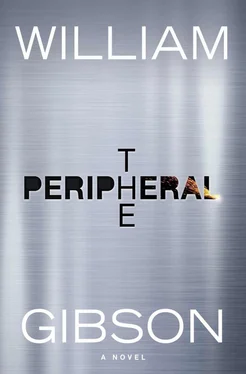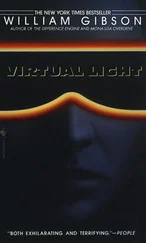William Gibson - The Peripheral
Здесь есть возможность читать онлайн «William Gibson - The Peripheral» весь текст электронной книги совершенно бесплатно (целиком полную версию без сокращений). В некоторых случаях можно слушать аудио, скачать через торрент в формате fb2 и присутствует краткое содержание. Год выпуска: 2014, Издательство: Penguin Group US, Жанр: Киберпанк, на английском языке. Описание произведения, (предисловие) а так же отзывы посетителей доступны на портале библиотеки ЛибКат.
- Название:The Peripheral
- Автор:
- Издательство:Penguin Group US
- Жанр:
- Год:2014
- ISBN:нет данных
- Рейтинг книги:3 / 5. Голосов: 1
-
Избранное:Добавить в избранное
- Отзывы:
-
Ваша оценка:
- 60
- 1
- 2
- 3
- 4
- 5
The Peripheral: краткое содержание, описание и аннотация
Предлагаем к чтению аннотацию, описание, краткое содержание или предисловие (зависит от того, что написал сам автор книги «The Peripheral»). Если вы не нашли необходимую информацию о книге — напишите в комментариях, мы постараемся отыскать её.
The Peripheral — читать онлайн бесплатно полную книгу (весь текст) целиком
Ниже представлен текст книги, разбитый по страницам. Система сохранения места последней прочитанной страницы, позволяет с удобством читать онлайн бесплатно книгу «The Peripheral», без необходимости каждый раз заново искать на чём Вы остановились. Поставьте закладку, и сможете в любой момент перейти на страницу, на которой закончили чтение.
Интервал:
Закладка:
The Michikoid, squatting in front of the bearded man, removed the Medici. It shrank, dwindled, the fluid within it darkening. Cleaners were at work on the compartment’s gray carpet, perfectly ordinary beige hexapods, removing the blood. Daedra and the bearded man sat at opposite ends of a backward-facing banquette, a second Michikoid between them, this watching Netherton and Flynne, having produced several pairs of shiny black spider-eyes for the purpose. Its arms had lengthened, both ahead and behind the elbow, and its hands were now knifelike white china fins, like the blades of two elegantly threatening spatulas.
Daedra looked from the bearded man to Netherton. “If I’d known how you’d fuck things up, I’d have killed you myself, the day I met you.”
This wasn’t something he’d ever had to respond to, before. He maintained his expression, which he hoped was neutral.
“I wish I had,” Daedra said. “If I’d known more about your stupid gift, what a stub was, I’d never have accepted. But you knew the Zubovs, or their one useless son, and I thought they’d be good to know. And Aelita hadn’t become a problem yet.”
“Be quiet,” said the bearded man, opening his eyes. “This isn’t secure. We’ll be there shortly, and you can say whatever you like.”
Daedra frowned, never liking to be told what to do. She adjusted the top of her dress. “Feeling better?” she asked him.
“Considerably. That was a broken collarbone, three broken ribs, and mild concussion.” He looked at Netherton. “We’ll start with those for you, shall we? Upon arrival.”
The windows depolarized, Netherton assuming the man had done that. He saw that they were turning onto Cheapside, and his immediate impulse was to warn them that they were violating a cosplay zone. But then he saw how utterly empty the street was. No carts, no cabs, no drays, no horses to pull them. They were headed west, past the shops vending shawls and feathers, scent and silver, all the fancy goods he’d strolled past with his mother, surreptitiously capturing the magic of the painted signs. He wondered where those images were today. He had no idea. The sidewalks were virtually empty, yet shouldn’t have been. They should have been bustling still, the day just ending. Yet the few lone walkers looked lost, confused, anxious. They were people, it struck him, so were unable to have followed whatever signal had gone out, to all those cloud-driven peripherals enacting the visible lives of cabmen, piecework tailors, gentlemen of leisure, street boys. As the car passed, they turned away, as he’d seen people turn away in Covent Garden, at the first glimpse of Lowbeer’s tipstaff.
“It’s empty,” said Flynne, sounding simply disappointed.
Netherton leaned to the side, peering around the tall back of the gray banquette, and saw, through the windscreen, the glowering bulk of Newgate. He’d only walked that far with his mother once, and she’d quickly turned around, repelled by the structure’s pitted granite flanks, spiked with iron.
At the City’s westernmost gate, she’d told him, for more than a thousand years, had stood a jail, and this its ultimate and final expression. Or had been, rather, as it had been torn down in 1902, at the start of that oddly optimistic age before the jackpot. To be rebuilt, then, by the assemblers, a few years before his birth. The klept (she would never have called it that in front of him) having deemed its return a wise and necessary thing.
Before them now, the very iron-bound wicket gate, of nail-studded oak, that he’d stared up at as a child. The one his mother told him had frightened Dickens, though he’d confused that with the Dickens being frightened out of someone.
It had frightened him then. And did now.
118
It wasn’t Conner. Not Conner. It was the peripheral. Lev’s brother’s. Pavel. Wilf called it Pavel. Called it the dancing master. And Conner had meant to do that. Had tried to kill this asshole with it. Was okay. Was back in his white bed, beside Burton, totally pissed that he’d missed. Even so, fifty-five floors, straight down, he’d come that close. No way he’d been aiming for the robot girl.
She knew she’d seen it, could tell you what had happened, but she couldn’t remember seeing it. That might be whatever the robot girls used to do the searches and scans, in that inflatable security tent, going into the party. Like the stuff they gave you for surgery. You didn’t sleep, exactly, but you didn’t remember.
Now it looked like they’d shut that Cheapside down.
And then she saw what Wilf was craning his neck at. Like a huge squashed stone pineapple, prickly with black iron spikes. Built to scare the shit out of people. So weird that she wondered why she’d never seen it in National Geographic . You’d figure it would be a big tourist thing.
Then the cardoor was open and the robot girls were getting them out, making sure they didn’t try to run.
Nobody to meet them. Just her, Wilf, Daedra, balcony man, and the two robot girls, their white faces flecked with the peripheral’s blood, like a robot skin disease. She had a robot girl’s white hand around her upper arm, guiding her from behind. The other one had Wilf.
In through a gate that reminded her of a Baptist anime of hell she’d seen. Burton and Leon had thought the fallen women were hot.
Into this thing’s shade, its coldness. Iron-barred doors, painted white but rust still coming through. Flagstone floors like paths in some very wrong garden. Dull lamps, like the eyes of big sick animals. Little windows, looking like they didn’t go anywhere. Up a narrow stone stairway, where they had to go one at a time. It was like the intro segment for a Ciencia Loca episode, paranormal investigators, going someplace where a lot of people had suffered and died, or maybe just where the feng shui was so totally fucked that it sucked in bad vibes like a black hole. But she’d probably have to go with suffered and died, by the look of it.
When they got to the top of the stairway, she looked back at her robot girl, saw that it had sprouted extra eyes on that side of its face, just to keep better track of her. Neither Daedra nor the balcony man were saying anything at all. Daedra was looking around like she was bored. Now they crossed a court, open to the cloudy glow of sky, and entered something like a narrow, prehistoric Hefty Inn atrium, four floors of what looked to be cells, up to a glass roof, little panes set in dark metal. Lights flickered on, thin bright strips beneath the railings on the floors of cells. She guessed that wouldn’t have been original. The robot girls marched them to a pair of whitewashed stone chairs, really simple, like a kid would build from blocks of wood, but much bigger, and sat them both down, side by side and about six feet apart. Something rough moved, against each of her wrists, and she looked down to see that she was fastened to the tops of the slabs that formed the chair’s arms, her wrists in thick rusted cuffs of iron, polished brown with use, like they’d been there a hundred years. It made her expect Pickett might walk in, and for all she knew, given the way things were going, she felt like he might.
The stone seat was cold, through the fabric of her dress.
“We’re waiting for someone.” Balcony man was talking to her. He seemed to have gotten over what Conner had tried to do to him, physically anyway.
“Why?” she asked him, like he’d tell her.
“He wants to be here when you die,” he said, watching her. “Not your peripheral. You. And you will, where you really are, in your own body, in a drone attack. Your headquarters is surrounded by government security forces. It’s about to be leveled.”
Читать дальшеИнтервал:
Закладка:
Похожие книги на «The Peripheral»
Представляем Вашему вниманию похожие книги на «The Peripheral» списком для выбора. Мы отобрали схожую по названию и смыслу литературу в надежде предоставить читателям больше вариантов отыскать новые, интересные, ещё непрочитанные произведения.
Обсуждение, отзывы о книге «The Peripheral» и просто собственные мнения читателей. Оставьте ваши комментарии, напишите, что Вы думаете о произведении, его смысле или главных героях. Укажите что конкретно понравилось, а что нет, и почему Вы так считаете.









